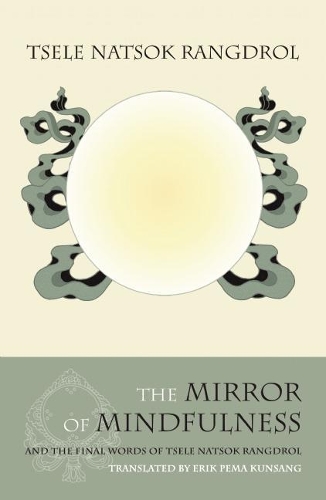
The Mirror of Mindfulness: The Cycle of the Four Bardos
(Paperback, Third Edition)
Publishing Details
The Mirror of Mindfulness: The Cycle of the Four Bardos
By (Author) Tsele Natsok Rangdrol
Translated by Erik Pema Kunsang
Rangjung Yeshe Publications,Nepal
Rangjung Yeshe Publications,Nepal
19th November 2010
Third Edition
Hong Kong
Classifications
General
Non Fiction
294.3423
Physical Properties
Paperback
160
Width 139mm, Height 215mm
212g
Description
This book main idea is that intrinsic to the heart, mind and spirit in every human being is an identical essence which can be realized. This realization makes any man or woman a Buddha. The focus of this book is the method of how to implement that through a system of training which is of timeless value, and not bound by cultural limitations. The ti
Reviews
"I considered that this explanation of the bardos would benefit everyone interested in the Dharma. The words are clear and easy to understand, and lengthy scholarly expositions are not emphasized. This text, easy to comprehend and containing all the key points and very direct instructions, results from following the oral advice of a qualified master."--Dilgo Khyentse Rinpoche.
"Bardo teachings may sound very fascinating and colourful, but the vital point is ones individual practice right now. Why have medicine when sick, if one doesnt use it Without training, our studies become mere intellectual understanding. If study were sufficient, we could simply lean back and read a book about Dzogchen. In fact, there is no way around actual training. The whole reason for receiving bardo teachings has been traditionally described as that of "connecting a broken water pipe"--by training now, one will be able to continue the "flow" of practice through the bardo state to the following life. In the Dzogchen system bardo training is indispensable."--Tulku Urgyen Rinpoche.
"[T]he subject matter, death and rebirth, is a very important and pertinent topic for both Buddhists and non-Buddhists. Tibetan Buddhism contains many books which encompass teachings on that topic, and this text is ... easy to undersand. The author's style is very clear, precise, and direct.... Therefore, please read it carefully and take the meaning to heart."--Tulku Chokyi Nyima
Author Bio
Tsele Natsok Rangdrol (born c. 1608) is renowned in the Kagyu and Nyingma schools of Tibetan Buddhism for his brilliant scholarship and meditative accomplishment.
Erik Pema Kunsang Schmidt has translated and edited more than fifty volumes of Tibetan texts and oral teachings, including "Treasures from Juniper Ridge." He lives in Denmark.
